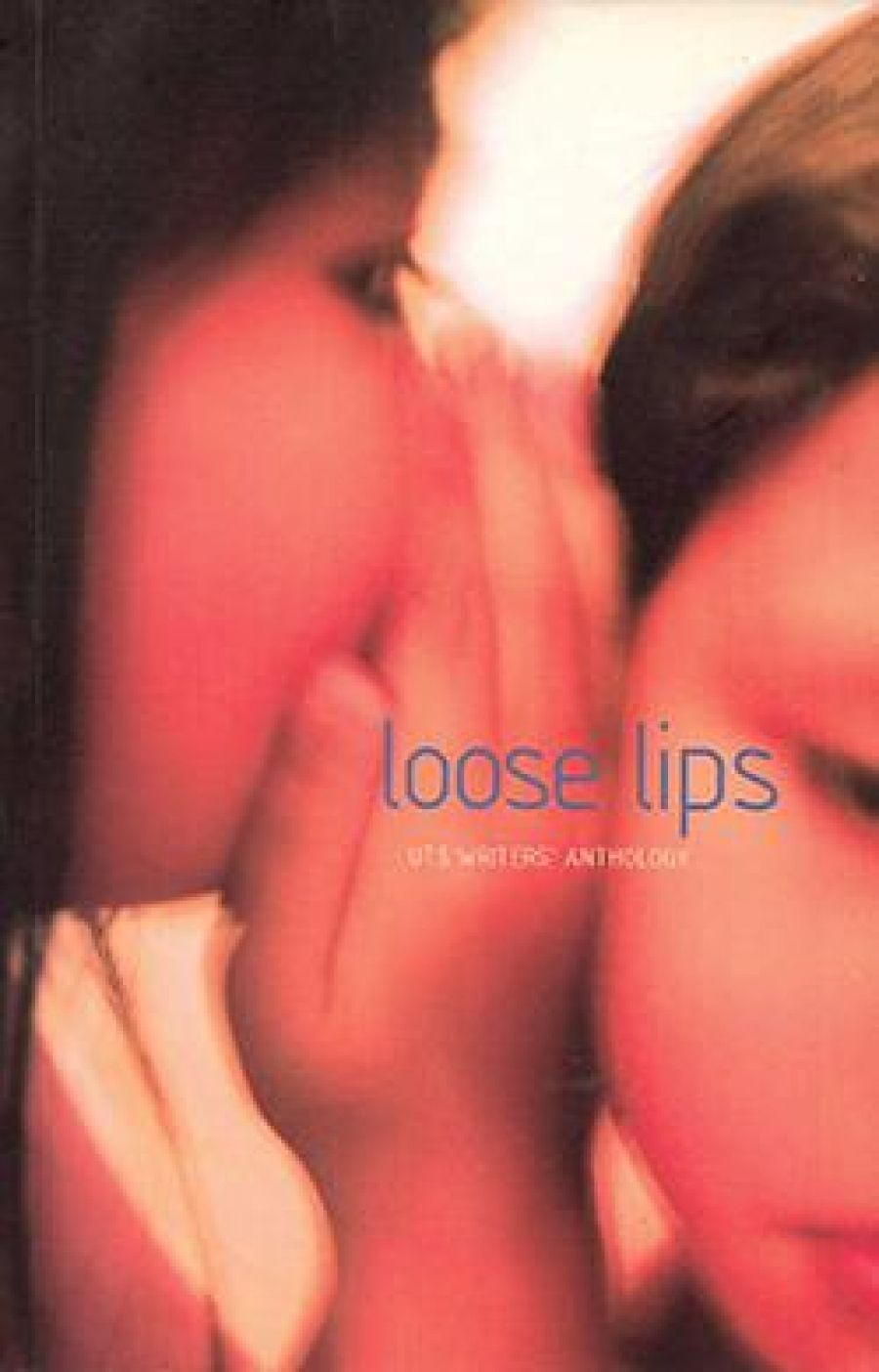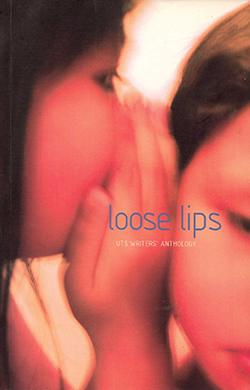
- Free Article: No
- Contents Category: Literary Studies
- Review Article: Yes
- Article Title: What Crisis?
- Online Only: No
- Custom Highlight Text:
Why are there so few new and exciting voices in Australian fiction? Why do Australian novels so consistently fail to capture the imagination of the reading public? What was the last Australian book you really liked? Where is the next generation of Australian authors going to come from? Who are three Australian writers under the age of thirty or forty?
- Book 1 Title: Loose Lips
- Book 1 Subtitle: UTS Writer's Anthology
- Book 1 Biblio: Halstead Press, $27.95pb, 192pp
- Book 1 Cover Small (400 x 600):

- Book 1 Cover (800 x 1200):

- Book 2 Title: True North
- Book 2 Subtitle: Contemporary Writing From The Northern Territory
- Book 2 Biblio: Charles Darwin University Press, $19.95pb, 161pp
- Book 3 Title: Best Stories Under The Sun
- Book 3 Biblio: Central Queensland University Press, $25.95pb, 186pp
You can count on the fingers of one hand the number of literary journals and magazines in Australia that publish new fiction regularly in any meaningful quantity. In the 1979 editorial for the first edition of Granta, the editors explained that they were motivated by the insulated and uninteresting nature of their local literary scene. ‘British fiction of the Fifties, Sixties, and even most of the Seventies,’ they argued, ‘lacks excitement, wants drive, provides comforts not challenges.’ This is all too familiar. It’s hard to imagine that a 21-year-old unheard-of Tim Winton could have a collection of short stories published in the current Australian literary climate. Single-author collections are reserved for writers of longevity; South Australian John Murray’s critically acclaimed collection of short stories was picked up in the UK and US before an Australian publisher took it on. It is in the anthologies that new voices have a chance to be published, and even they are thin on the ground. Apart from the mainstays such as the Best Australian Stories and the quarterly fiction journals, these anthologies are semi-regular at best.
Thematic or regional devices are often employed to order the material that has been gathered and even in some places to justify it. If the theme – Penguin’s Summer Stories, Scorched, springs to mind – is too prominent, the book is likely to comprise chiefly established writers offering new thoughts on the topic, or extracts from longer works. Such collections have a value in that they provide a comprehensive and eminently readable snapshot of what our major authors are up to. But they epitomise the notion of literature that is more likely to provide ‘comforts not challenges’, and they offer very little for emerging writers. Best Stories under the Sun is one such collection. At face value, this collection has quite a cross-section of established and new writers, but ultimately the pieces by the ‘names’ in the anthology dominate. It’s always good to read something new by Marion Halligan, Carmel Bird or Alex Miller, but extracts from other works and recycled pieces are of interest rather than offering drive or excitement.
The subject matter and styles jump around dramatically from story to story. The shift from fantastical stories about the undead or excessively chatty fish, to historical pieces in a strictly realist mode, demonstrates an energy and imaginative drive that keep much of the book afloat. But with many of the stories feeling overly familiar and at times even generic, I found myself longing for a more thematic focus. Although this is a Queensland publication, these stories are only ‘under the sun’ insofar as they might make diverting beach reading. Were I confident I was reading new Queensland voices alongside established writers’ reflections, the whole exercise would have felt less like a ‘short-story-anthology-by-numbers’. Sally Breen’s ‘Ante Up’, while only a portion of a novel-in-progress, is clear-eyed and lyrical. Tina Tither Landeros, J.M.A. Stenning and Phillip Edmonds have all written stories of great charm and skill. But while Michael Wilding and David Myers deserve credit as writers for their contributions to the anthology, as editors of the collection they should be forced to justify the inclusion of the story by Jack London. As a cultural curio, it is diverting, but it feels more than a little unnecessary. There are some terrific stories within – if not the ‘best’ under the sun – but as a collection this is pretty inessential stuff. When readers profess to be uninspired by short stories, this is the sort of collection that they may well have in mind.
True North: Contemporary Writing from the Northern Territory is a different beast altogether. Its editor, Marian Devitt, counsels caution against parochialism and warns her readers not to expect a unilateral face to the Northern Territory experience. Her collection reflects what new voices are emerging from the north and demonstrates, in the words of Peter Goldsworthy, how ‘writers from the Territory … punch above their population in the wider literary world in the freshness of their writing, their veracity, and their willingness to tackle substantial matters’. On the basis of this collection, I couldn’t agree more. Alan Whykes takes us a long way out of the Northern Territory as his young hero grapples with Perugia and family expectations from back home. Whykes displays a lovely turn of phrase, and his clear imagery and energetic descriptions transcend subject matter that, in lesser hands, might have seemed a little tired. Jo Dutton’s ‘Sitting Ghosts’ is similarly deft, and the sun, salt and adolescent hurt are all vibrantly conjured. Kathryn Brewer’s account of a chance encounter between an established Territorian and a ‘bloody tourist’ in the desert north of Alice Springs is a quietly moving story of disconnection and solitude. Reading these and other stories in this anthology, I found myself unusually excited about the state of Australian fiction. The collection is patchy, and the poetry and non-fiction contributions did not excite me, but anyone with an interest in answering any of the questions posed in the opening of this review would do well to read this book.
The same can be said – possibly even more so – of Loose Lips, the anthology of short stories by students of the University of Technology Sydney’s writing programme. These are young writers whose influences are many and varied, and who are not afraid to take risks. Nik Rodden’s piece is a beautifully realised snapshot of several lives, both embracing and subverting his readers’ expectations of that classic Australian trope, the road trip. Jonathon R. Tyne’s ‘Happy in the Age of Machines’ is reminiscent of early Murray Bail: surreal, sure-footed, at turns funny and moving. Even those elements that don’t work completely are rewarding because of their energy and innovativeness. One piece written in the second person – a literary device that I usually abhor – is written with such panache by its author, Sam Butler, that I found myself entranced. Kathryn Morgan’s ‘Cig-Quitter: Reclaiming Sex’ is jarring and unsettling, wonderfully so.
A couple of stories in script form sit a little uneasily in the collection. There’s a lot to like in both pieces, yet somehow they don’t quite work on the page in their own right; each offers a few laughs and surprises, but neither breaks any new ground. Despite this, each comes at a point in the collection where there is a real risk of the stories taking on a familiar quality. Instead, the anthology lifts, turns in un-expected directions, and moves on. It is a clever editorial move and should be applauded.
Sally Chadwick and Michele Freeman shift their distinctly Australian focus overseas to considerable effect. Julie Chevalier and Michael Warrilow both produce impressive works of ventriloquism, vividly creating believable and compassionate characters. Everyone associated with this anthology should take a moment to pat themselves on the back and then get back to writing more, pronto. This is an exciting collection, an inspiring collection and, most importantly, a promising collection. Any crisis in Australian fiction does not lie with the ideas or the writers. I’d happily read anything else by just about any of the new authors in these anthologies. Let’s have more places where we can do just that.


Comments powered by CComment